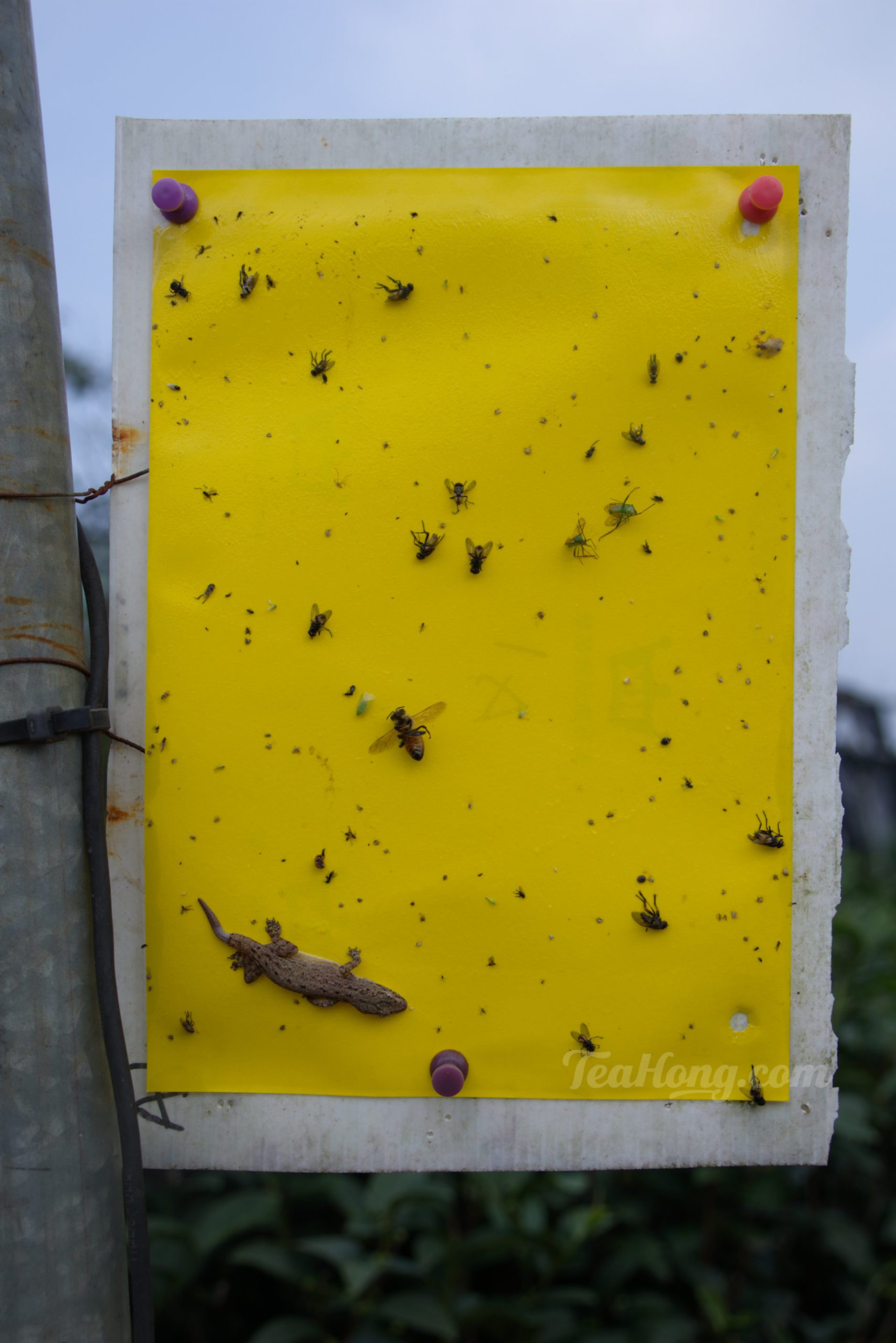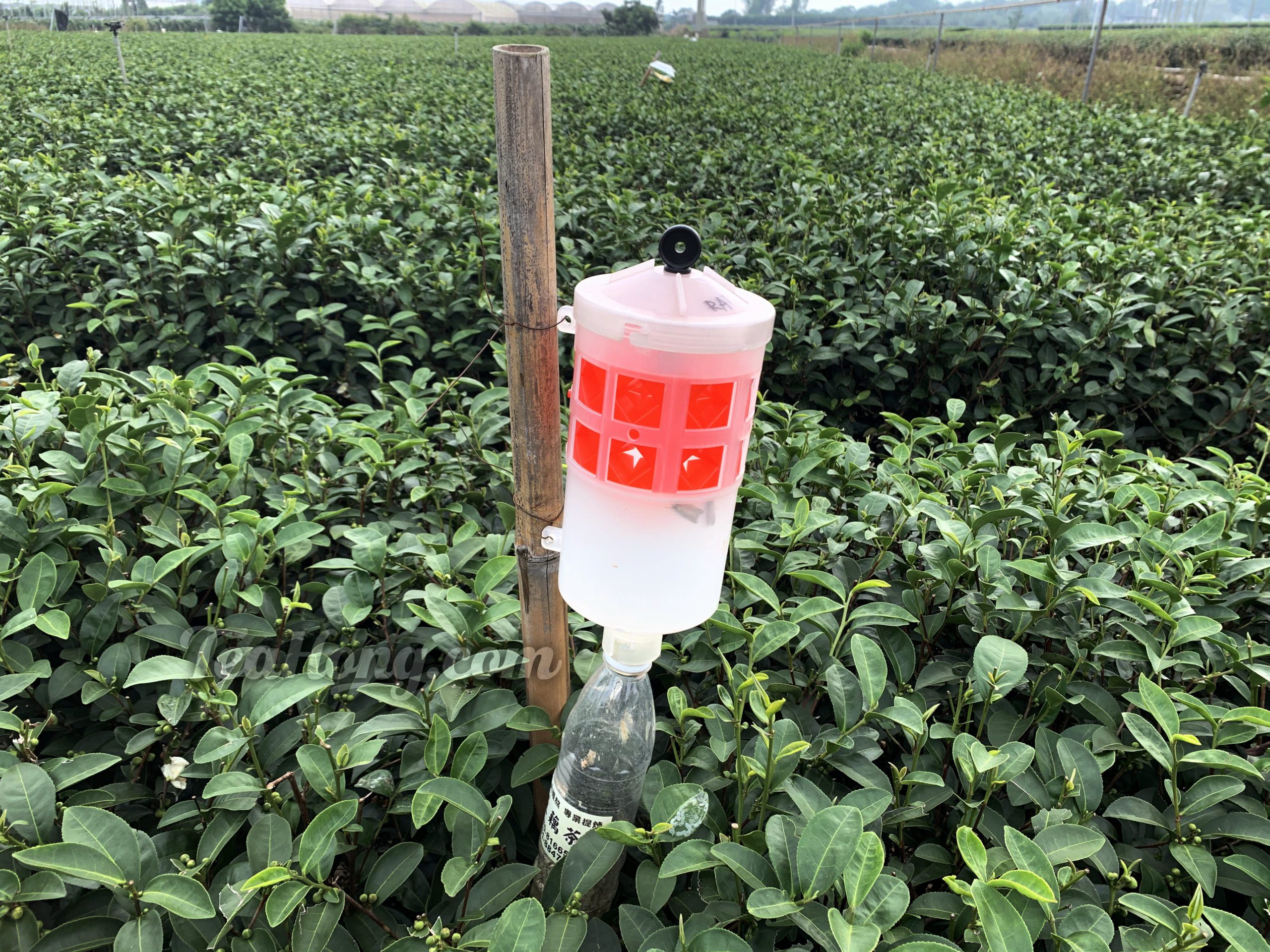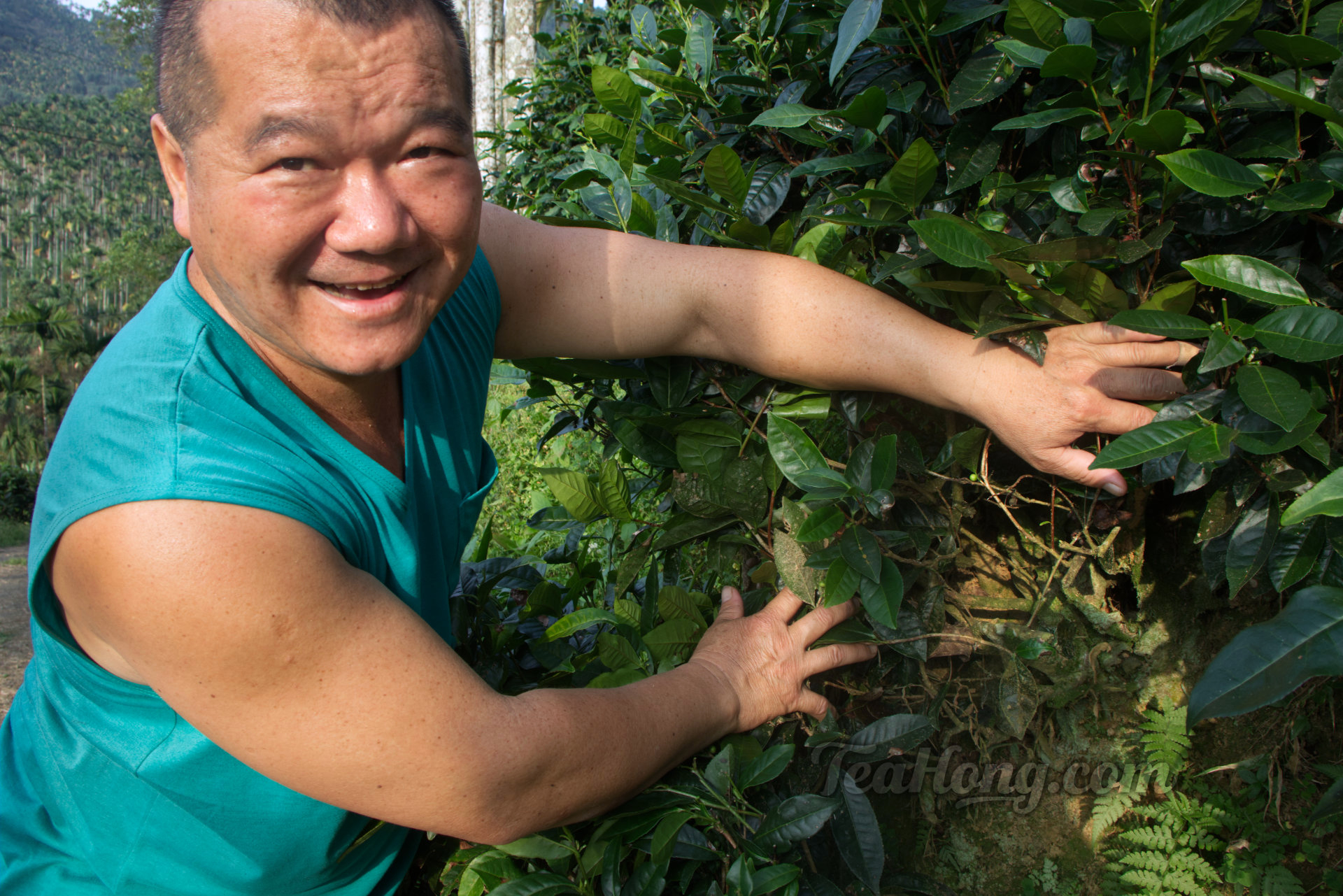92 years-old tea farmer
When I tasted his Oriental Beauty and said it was good, Chen Guo Ching beamed with excitement. He said for the next harvest he could customise the degree of oxidation to how I’d like it. I was actually more interested in his matured Paochong and the black tea that he called Red Plum. However, it is his age that concerns me, despite his vigour enthusiasm.


92 years old tea farmer Chen Guo Ching in front of his wall of awards and certificates
He is 92 and has been making tea in this patch in Ping Lin in the northern part of Taiwan since youth. Maybe it’s his age or his poor salesmanship, he kept telling me that the Council ( Council of Agriculture, Taiwan’s counterpart of USDA ) has certified that his products have zero chemical residues, holding the crinkled piece of official report. I guess that is as organic as it gets for Chen. It is the taste that really matters to me after all. This MRL ( maximum residual levels ) certificate is only an assurance that we are not harming the body as we drink tea, amidst all contamination and environmental issues in the world today.
It is good tea that matters
To expect him to push further for organic certification is diverting the precious remaining energy of this master from what he should be doing — making of good tea. And I very much treasure this old style taste he can deliver.
Yet that is not to say other tea farmers are not responding to the market’s need for safer and eco friendly products.


Ms Huang holding weeds she just pulled from amongst this row of tea bushes
20 years ago Huang’s father began to turn his one hectare of land into an organic tea farm, the very next day after he retired as a high school Mathematics teacher. Today, the son is showing me his two hectares of certified organic tea farms. Telling me stories of snakes, wasps, moths, leaf hoppers, and termites. His sister and brother-in-law were sweating under the tropical sun, busy pulling out over-grown and weeds to facilitate the planned harvest tomorrow morning.


Methods alternative to pesticides such as this bug sticker, is commonly used. Yet this kills useful elements in the environment as well, which puts question in its effectiveness in the health of the environment for the tea plant. Other than moths, hoppers and fleas, this bug sticker has killed a gecko and a bee. Both of which are instrumental in the balance of a good eco system.
Organic agriculture in Taiwan
Less than 1.5% of all farm land in the island state practice organic or eco agriculture. In the area of tea, there is no specific data yet. However, many are pushing for the practice.
Yu Wen collects greens ( aka cha ching, or cha qing, meaning freshly harvested green leaves ) from her neighbouring farms to make her own productions. It is a very common practice here, and in China as well. She has been encouraging her growers with all sorts of incentives to go organic or eco.
After her father passed away two years ago, the huge organic farm he developed 1100 km away in China was sold. Bringing organic practice back home may have been her mission ever since. She thinks organic and eco farming is the future and the sooner everyone takes on it, the better it will be. She herself is careful with what she eats and wants the same for her two lovely young boys. Health is most important, she says. Her father died of cancer.
Organic experiments in production farm
Taiwan’s government is not the most responsive to the needs of the time, but they are still doing something recently. A piece of legislature came into effect this May to give the government a legal reference for protecting the environment from agricultural contaminants. In return, subsidies and rent reduction are granted to farmers for switching to eco friendly or organic practices.
In fact, the Council of Agriculture has been working with local institutes to promote and develop solutions. Yu Wen introduced me to Mr Yu to learn more about this. The man laughed almost the entire hour during the farm tour. With his round middle section, he could very well be the Happy Buddha if he had shaved his thick black hair.
Sweet earth
I told him how much I appreciate the sweet smell of his soil. Indeed once I stepped into the tea garden, the olfactory sensation made a marked difference from all the other tea farms I have visited. This already told me that this haired buddha knows what to put in the ground. He was so delighted that he explained in great details how he prepare his organic fertilisers before deploying onto the field for the desired effectiveness, and not all those bad side effects as pests and weeds. His bushes are thick, big, and very strong.


This is one of the moth trappers used in Mr Yu’s tea gardens. It has a RA1 mark on it, denoting the pheromone targeting a specific moth which caterpillar is a serious threat to the tea plant. You can see a moth already trapped in there. There were actually about seven of them in this bottle when we checked.
A local university has developed with him a special yeast for effective decomposition of organic fertilisers. There is even a signboard in one of his buildings saying this is where the yeast is sold.
For the sake of my own health, and for that of my children’s
As he shook the moth trap to show me another university supervised experiment in his farm for natural pest control, I asked whether there were still pest problems. “Of course there are. You get a lower yield than farms using pesticides,” he said with his hallmark laughter. “However, the moment I first smelled the spraying of that chemical, I said to myself, I am not going to slowly kill myself in order to make a living. I’d rather stay poor but happy. For the sake of my own health, and for that of my children’s. I am not going to use that thing again.”


Mr Yu works with a local university to develop a yeast for effective fertilising the tea field. People not only come to study its application here, but also buy the yeast form him. The signboard reads: Supplier of Yeast 18 by Professor Chai Dong Zuan of Chung Hing University
That’s almost 30 years ago when he accepted his father’s offer to take up the tea farm, giving up his love for motorcycle mechanics. His farm is now basically a showcase and experimental ground for organic farming in this part of Nantou.
Laissez faire kind of eco
An hour’s drive away, in Yu Chi, where the Japanese colonial government introduced Assamica varieties to Taiwan for experimentation production in the 1930’s, however, Li Guo Zhen cares less about fertilisers nor pesticides. He simply lets his plants grow wild, only to prune them once a few years to keep them at manageable height for plucking. He is basically reversing modern tea plantation back to ancient style tea farming: plucking only when the leaves are right and leave them alone at other times. The trees that were planted in those days form a large proportion of his leaf source. Where the old trees do not survive, he just let other plants take over, or where he pleases, plants another tea tree. The overall density of his farm is therefore very much lower than any others. It reminds me of the wild tea tree forests in Yunnan, only that the plants here are pruned.
Beautiful black tea from old wild bushes
The rustic looking tea master makes really beautiful black teas out of these leaves, and from new cultivars that he grows along other slopes, to the same density of the old plants. Cherry trees, pines and orange trees interlaced his various slopes, together with those tea trees from early last centuries, and shrubs and plants which I could not recognise.


Mr Li showing termite issue in one of his old tea bushes. “When I have time, I will flush this hole with water to drive away the bug, hopefully to save the bush,” he said
Li was once a chef. Food and wine still occupy a large part of his mind. I do not know what changed his path to return home to work the family farm, and in the process taken up a huge loan to buy back from the government the land that holds all those near centenarian tea trees. I see that he loves this land and its water. He just filled a 15 litre can with rice wine that he brewed with the underground water here and asked if we would want some.
Respect for the self, respect for Nature
I guess other than the connection with the land, it maybe his mother. She is the only other reason that keeps him busy besides tea and the hobby of food and wine. Old Mrs Li has lung cancer and the doctor has already given up on therapies and let her stay home now.
“In the old days when those old people needed to get rid of the garbage in this remote area, they just burned it. When there’s plastic or rubber or other artificial things in it, the smell really hurts you. I think that’s how my mother got that thing.” Maybe that’s why the ex-chef hates anything chemical and keep saying how important conserving of the environment is.
This respect of Nature used to be an ideal in the Chinese Classics, yet somehow forgotten. Organic or eco, in the end, it is the well-being of the self and the future generations that really matters.


Mr Li picked up two plucks from the wilting table to show me how small the leaves are after being bitten by those green leafhoppers. They are actually less than half the size compared with the normal ones on the table. However, the hormone secreted by the leaves that refrains growth is the same that gives the black tea made from such leaves their hallmark aroma.
If you are interested in teas that are produced in this region from the people mentioned, here are some of them:
Or see all our Taiwan teas here:
Comments (0)
Leave a reply
You must be logged in to post a comment.




